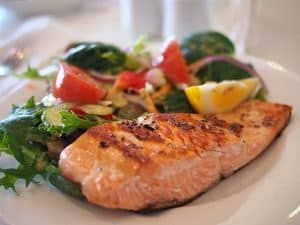Recent trends may show more endurance athletes practicing low-carb, high-fat diets, such as keto. This may not be the best choice for runners and other endurance athletes.
Commonly, the diet practiced by runners, cyclists, and triathletes provides plenty of good carbs and fat. Most of these athletes need plenty of calories for energy, which good carbs and fat provide.
Should Endurance Athletes Adopt a Low Carb, High Fat Diet?
Anytime a diet gains steam with the mainstream population some athletes may consider using it. However, most mainstream diets are designed for fast weight loss, which doesn’t benefit the endurance athlete.
With low carb, high-fat diets becoming all the rage, it’s surprising there aren’t more studies done on this type of diet among athletes, like this one done on cyclists.
Most of the studies show very little if any benefit for cycling and running endurance when practicing a low-carb, high-fat diet. While the studies have not shown many benefits, some athletes still believe a low-carb, high-fat diet is the right way to go.
Why Some Athletes Think Low-Carb, High-Fat Works

The theory is, with this type of diet an athlete can manipulate the type of fuel their body relies on for exercise. This manipulation will improve the ability of the athletes to use fat during exercise, which means they can rely less on the carbs they have stored.
Since even the leanest athletes have an endless supply of fat for energy, athletes believe they can go further without hitting the wall and becoming fatigued. Some endurance athletes believe they can run further and faster without carbs becoming depleted and causing the feelings of exhaustion, lethargy, and dizziness.
Why the Low-Carb, High-Fat Might Not Fit for Endurance Athletes
Yes, many studies have shown, practicing a low-carb, high-fat diet will help an endurance athlete utilize fat for energy during exercise. However, practicing this type of diet will also cause an athlete’s body to decrease in the ability to use carbs for energy. When it comes to higher-intensity exercise, athletes end up with a reduced capacity and decreased performance.
The real problem with a low-carb, high-fat diet is the way it limits the athlete. At low intensity, it may provide some benefits, but endurance athletes need to train and perform at a high-intensity, even if just some of the time.
Endurance athletes need to be able to use both fat and carbs for energy during exercise. This ability is known as metabolic flexibility and it’s vital for endurance athletes trying to reach peak performance.
Balancing Carbs and Fat as an Endurance Athlete

Before looking at how an endurance athlete should balance carbs and fat, it’s important to note, not all carbs and fat are equal. There are good carbs and good fat, which is what you want as an athlete. Bad fats and carbs should be avoided.
Bad Fats and Carbs
- Fried foods
- Margarine
- Hydrogenated oils
- Simple sugars
- Sugary drinks
- Juices
- White bread
- Processed foods
- Pork fat
Good Fats and Carbs
- Avocados
- Fatty fish
- Olives
- Seeds
- Nuts
- Whole grains
- Quinoa
- Oats
- Whole fruits
- Sweet potatoes
Daily Carb Intake for Endurance Runners
During training, an endurance athlete should consume 2.5 to 4.5 grams per pound of body weight of good carbs. Your diet should be about 55% to 65% good carbs.
When you’re not training, you can lower the number of carbs to 2.5 to 3 grams per pound of body weight. If you’re an ultra-endurance athlete, aim for 4.5 grams per pound of body weight or more.
Daily Fat Intake for Endurance Runners
The fat intake for endurance athletes should range from about 20% to 35% of daily calories. Fat is needed a bit more when doing endurance exercise compared to high-intensity exercise.
Why Good Carbs and Fats are Important for Endurance Athletes
Good carbs provide energy for the body. They are sugar-based molecules used by the body to produce glucose, which is stored in the liver and muscles as glycogen. When glycogen is stored, it can be used for energy later.
Just like carbs, fat offers an energy supply for endurance athletes. Fat will also help form cell membranes and support the brain and nervous system. When you consume good fats, it will also act as a transport for important vitamins.
Endurance athletes need good carbs and good fats to perform their best. A diet rich in healthy foods filled with good carbs and fats will support intense training and competition.
If you have any questions regarding fueling for performance email me. Also visit my Bree Lambert- Live Well. Finish Strong. on YouTube




